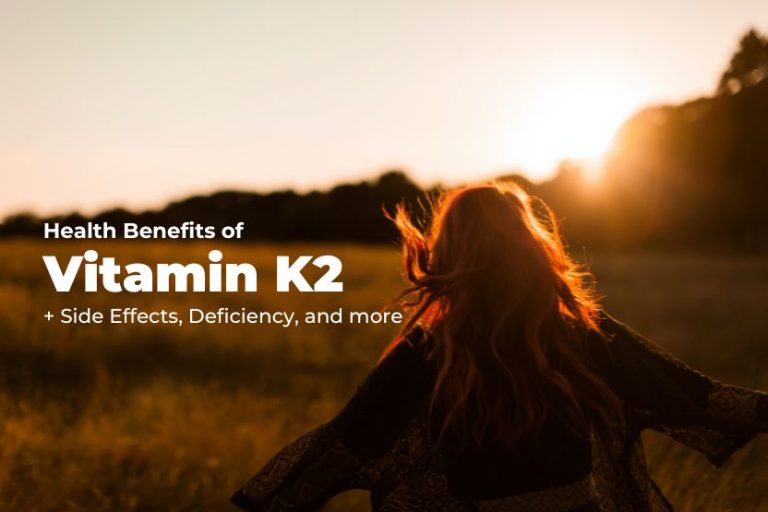Vitamin K is an essential fat-soluble nutrient that comes in two forms: vitamin K1 and vitamin K2. It plays a vital role in cancer prevention and cardiovascular and bone health. When it comes to bone health, K2 is especially important in that, together with vitamin D3, it ensures calcium is better absorbed by our bodies and so improves bone strength and reduces the risk of fractures. It also prevents calcium from being deposited in our arteries, thus contributing to heart health.
In this article, we’ll look at why we need K2, where to get it and explore its vital role in bone and heart health when combined with vitamin D3 in supplement form.
Benefits Of Vitamin K2
Growing evidence shows that vitamin K2 can impact conditions beyond those related to cancer, bone, and cardiovascular health. Let’s take a look at all the benefits of vitamin K2 supplementation:
Building Stronger Bones
For our bodies to have strong bones and optimum bone density, we need calcium AND vitamins D3 and K2. This is because vitamin D3 ensures that calcium is better absorbed in the body. Vitamin K2 activates the protein osteocalcin, which in turn helps calcium bind to our bones rather than accumulate in deposits in our arteries.
Protecting Heart Health
Vitamin K plays an essential role in breaking down calcium in our bodies. Doing so prevents calcium from forming hard deposits in our artery walls, promoting arterial flexibility and flow. As a result, healthy blood vessels ensure healthy blood circulation, reducing the risk of blood clots and heart disease.
Anticancer Properties
Recent research has found that vitamin K2 may slow or stop cancer cell activity, thereby improving survival rates and reducing recurrence.
Another way vitamin K2 protects against cancer is by inducing cancer cell apoptosis – an essential method by which the body rids itself of abnormal or unneeded cells. This is significant because cancer cells may prevent apoptosis.
Causes And Symptoms Of Vitamin K2 Deficiency
As mentioned, vitamin K2 is a fat-soluble vitamin, which means that it is best absorbed along with dietary fats and can be stored in our body’s fatty tissue. However, unlike other fat-soluble vitamins, vitamin K2 cannot be stored in the body for long. This makes vitamin K2 deficiency more common, especially if you don’t get enough from your diet.
Vitamin K2 intake is also generally lower in the Western diet. For instance, an 85-gram serving of ground beef or chicken breast only contains 6-13 mcg of vitamin K2. The starting dose of vitamin K2 that we need is typically 100 mcg daily.
A lack of sufficient vitamin K2 sets us up for potentially devastating effects on our heart health, bone density, and immune system in the long term. In the short term, a deficiency of vitamin K2 could prevent healthy blood clotting and cause excessive bleeding and bruising when blood vessels are injured.
How Much Vitamin K Do You Need?
Vitamin K is a nutrient that is important for blood clotting and bone health. The body needs vitamin K to make proteins that are involved in these processes.
The amount of vitamin K that a person needs depends on their age. As per EFSA, the defined daily adequate intakes for vitamin K are as follows:
- 10 µg for infants aged 7-11 months.
- 12 µg for children aged 1-3 years.
- 20 µg for children aged 4-6.
- 30 µg for children aged 7-10.
- 45 µg for children aged 11-14.
- 65 µg for adolescents aged 15-17 and
- 70 µg for adults, including pregnant and lactating women.
The European Nutrient Reference Value (NRV) for adults for vitamin K is set at 70 micrograms/day (0.070 mg). The value is the same for Vitamin K1 Phylloquinone and Vitamin K2 Menaquinone.
Vitamin K1 and K2 are the two main types of vitamin K. Vitamin K1 is found in leafy green vegetables, while vitamin K2 is found in animal products and fermented foods. MK-7 is a form of vitamin K2 that is made by bacteria.
Vitamin K2 And Vitamin D3
A combination of vitamin D3 and vitamin K2 is beneficial for many reasons. They work together to strengthen your bones and provide other benefits, such as preventing heart disease and can improve our insulin response. They also reduce calcification of the arteries, a leading cause of heart disease. Together, they have been shown to boost immune system functioning.
It’s important to note that high doses of vitamin D, without vitamin K to temper it, may cause high calcium levels in your blood that can lead to blood vessel calcification, which in turn can lead to heart disease or stroke.
Vitamin K1 Vs Vitamin K2
Vitamins K1 and K2 have different roles in our bodies and are obtained from different sources. The liver absorbs vitamin K1, and vitamin K2 is distributed throughout the body. In the average Western diet, about 90% of the vitamin K we consume is K1.
Vitamin K1 is known as phylloquinone and is found mainly in plant foods. Vitamin K2 is known as menaquinone and is found in animal products and fermented foods. K2 is also produced naturally by human gut bacteria that transform Vitamin K1 into Vitamin K2.
MK-4 VS MK-7
Vitamin K2 comes in many different forms called menaquinones, of which MK-4 and MK-7 are the most important strains. MK-4 is synthetic, and MK-7 is natural. These two forms are quite different. MK-7 has higher bioavailability and a longer half-life (3 days vs 1-2 hours for K1).
This results in more stable blood levels, greater vitamin K (MK-7) accumulation, and better blood coagulation cofactor activity. The best sources of MK-7 are fermented plant foods, like nattō (fermented soy). Most of the MK-7 you consume goes to the bones and liver.
MK-4 tends to accumulate in the peripheral tissues, where it prevents the unhealthy accumulation of calcium deposits. Good sources of MK-4 are animal products, including egg yolks, dark chicken meat, and liver.

Food Sources of Vitamin K2
Primarily we can find vitamin K2 in animal-based products, some of which we’ve mentioned above, and fermented foods. Here is a quick list:
- Nattō, a Japanese dish made from fermented soybeans, is the richest source of vitamin K2.
- Eel is a great seafood alternative as a 100g serving provides 63 mcg of vitamin K2.
- Cheeses are also excellent sources of vitamin K2, although the amount obtained varies depending on the type of cheese. Generally, the older the cheese, the more K2 it contains.
- Chicken, especially dark leg and thigh meat, contains adequate amounts of vitamin K2.
- Butter, egg yolks, lard, and animal-based foods are also satisfactory sources of Vitamin K2.
Vitamin K2 And Vegan Diets
Considering the sources of vitamin K2 are primarily sourced from animal products, vegans are at particular risk of deficiency.
One way to combat this is to ensure you get enough vitamin K1 from dark, leafy green vegetables, such as kale and broccoli, and fruits, such as blueberries and grapes. Your body can then convert some of the K1 obtained from these into vitamin K2.
In addition to the vegan sources mentioned above, vegans should include fermented foods such as kombucha and tempeh in their daily diet.
Supplementing With Vitamin K2
Supplements are an excellent way to ensure you meet your daily vitamin K2 requirements. However, ensuring you take the right vitamin K form is vital.
Because the market is saturated with Vitamin D products that don’t contain K2 (or the right form), we created Epsilon. Life Vitamin D3 K2 MK7 supplement. It is a powerful combination of Vitamin D3 with Vitamin K2 as MK-7. This innovative supplement is enriched with MCT oil to support the absorption of vitamins D and K.
Side Effects
Although rare, if any of the side effects listed below arise, the best practice is to contact your medical practitioner.
- Lack of appetite
- Swelling of body
- Muscle stiffness
- Skin or eyes turn yellow
- Enlarging of liver
- Difficulty moving or being active
- Paleness
Conclusion
Vitamin K is a fat-soluble nutrient that comes in two forms: vitamin K1 and vitamin K2. Ensuring that you have adequate amounts of vitamin K in your diet or through supplementation could prevent cancer and cardiovascular and bone health.
Vitamin K2 cannot perform its vital role in protecting our health unless it is combined with vitamin D3.
Vitamin D3 K2 MK7 plant-based capsules are a highly effective supplementation solution. They contain no artificial fillers, flavours or sweeteners, and we produce them in a state-of-the-art GMP-certified facility in the UK.



